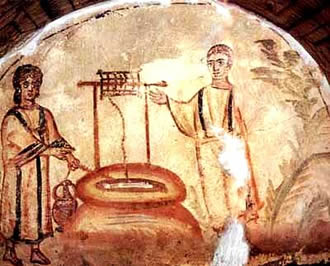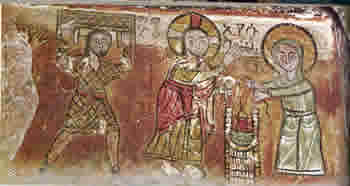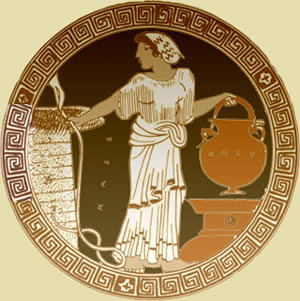Living for More Than Bread and Water
Third Sunday in Lent
For Sunday March 27, 2011
Lectionary Readings (Revised Common Lectionary, Year A)
Exodus 17:1–7
Psalm 95
Romans 5:1–11
John 4:5–42
The Brazilian Paulo Coelho's books have sold 100 million copies, been translated into 70 languages, and sold in 150 countries. But life was not always so sweet for Coelho. When he followed his childhood dream of being a writer, his parents twice committed him to a mental institution, where his treatments included electroconvulsive therapy. He dropped out of law school, traveled, joined the drug culture, dabbled in journalism and theater, and became a political agitator. After being kidnapped and tortured, he wanted a more "normal" life, and later enjoyed success as a song writer and music executive.
 |
Jesus and the woman at the well, 4th century Roman catacomb. |
But Coelho's soul remained restless. In 1986 he had a vision of a stranger, which stranger he met two months later in a cafe in Amsterdam. The stranger advised him to reconnect with his Catholic roots, and to make the 500-mile medieval pilgrimage to Compostela in Northern Spain (where legend says the bones of Saint James are buried). The pilgrimage convinced Coelho that he was living "only for bread and water." Two years later, he published The Alchemist, a simple fable about a shepherd boy named Santiago. Like the author himself, Santiago vows not to live like his sheep and even his own father, both of whom lived "only for bread and water."
Our Lenten rituals remind us of the ancient truth that we don't live "by bread alone" (Deuteronomy 8:3 = Matthew 4:4), but by God's sustaining Spirit. This was precisely what the Israelites forgot in this week's Old Testament lesson (Exodus 17). At Lent we daub ashes on our forehead to remember our mortality — "from dust you came and to dust you shall return" (Genesis 3:19 and Ecclesiastes 3:30). We abstain from alcohol or meat to acknowledge our embodiment. But these outward acts of a physical nature aren't ends in themselves; they point us to inward realities of a spiritual nature. Material sustenance is good and necessary, but living "only for bread and water" leads to spiritual malnourishment.
In the gospel this week a most unlikely "teacher" makes this point. Jesus's encounter with the Samaritan woman at the well reminds us that the community he inaugurated calls for a people of inclusion not exclusion, dignity not denigration, empowerment rather than exploitation, and affirmation rather than marginalization. His simple request for a drink of water provoked a dialogue with a marginalized woman that teaches us that God does not desire any human being to shrivel and die from a parched soul. Rather, he longs to quench the deepest needs and desires of each one of us with the "living water" of his Spirit.
As Jesus traveled from Judea to Galilee he stopped in the town of Sychar around noon time, tired and thirsty from the journey. He sat down by a well and asked a Samaritan woman for a drink of water. That Jesus, a Jew, would talk to a Samaritan shocked the woman (4:9). That he would talk to a woman surprised His own disciples (4:27). In fact, through death or divorce, this woman had burned through five marriages and was then living with a boyfriend not her husband (4:18).
 |
Jesus, the paralytic, and the woman at the well, 13th century Ethiopia. |
When you connect the dots of her story, you realize that in her one person this woman epitomized the many ways that society marginalizes people. Jesus shatters all the taboos that held sway then (and now) — gender discrimination, ritual purity (sharing a drinking cup with a Samaritan), socio-economic poverty (any woman married five times was poor), religious hostility, and the moral stigma of serial marriages.
In marked contrast to the male rabbi and scholar Nicodemus in the previous chapter, the Samaritan woman displayed spiritual thirst, candor about her many problems, and genuine insight about her real needs. She longed not only for literal water, but for the "living water" (4:11) that Jesus offered her, so much so that in her excitement she forgot her water jar when she returned to town (4:28). Spiritual nourishment suddenly became more important than material sustenance.
This thoroughly powerless woman made such a powerful impression upon Jesus and her own neighbors that John included an interesting eyewitness detail about Jesus's itinerary: upon the neighbors's request, "he stayed two days" in Sychar (John 4:40). The woman embraced Jesus as the Messiah, her witness converted many other fellow Samaritans in town (4:39), and she became the cause of the story's punch line: "We no longer believe just because of what you said; now we have heard for ourselves, and we really know that this man is the Savior of the world" (4:42).
As in so many gospel stories about God's alternative community, John 4 subverts and reverses conventional human wisdom and power relations. Jesus not only engaged a disreputable, ostracized, foreign woman; he cast her as the hero of the story, a symbol of life in his kingdom, and as an ardent witness to his universal lordship. She warns us of religiosity that turns a deaf ear to the disenfranchised, and which masks an otherwise smug, exclusionary and self-serving faith.
 |
A woman draws water from a well, 5th century BC Greece. |
Jesus also offers each one of us the "living water" that is the life-giving action of his Spirit in the deepest recesses of our being. In the beautiful poetry of the Hebrew prophet Isaiah (55:1–3), God welcomes every person, rich or poor, to drink deeply of what he alone can give us and what the mere "bread and water" that our culture offers — money, jobs, prestige, the proper zip code, the best university degree, or the latest diet — can never satisfy.
Come, all you who are thirsty,
come to the waters;
and you who have no money,
come, buy and eat!
Come, buy wine and milk
without money and without cost.
Why spend money on what is not bread,
and your labor on what does not satisfy?
Listen, listen to me, and eat what is good,
and your soul will delight in the richest of fare.
Give ear and come to me;
hear me, that your soul may live.
The Samaritan "woman at the well" is ultimately a story about "the woman and the water." She invites us to the inward personal renewal symbolized by the outward act of drinking water: "Everyone who drinks this ordinary well water will be thirsty again, but whoever drinks the water I give him will never thirst. Indeed, the water I give him will become in him a spring of water welling up to eternal life" (4:14).
For further reflection:
A Lenten prayer from Saint Ephraim of Syria (4th century):
O Lord and Master of my life,
take from me the spirit of sloth, despair, lust of power, and idle talk,
but grant rather the spirit of chastity, humility, patience, and love to Thy servant.
Yea, O Lord and King,
grant me to see my own transgressions and not to judge my brother,
for blessed art Thou, unto ages of ages. Amen
Image credits: (1) Christian Iconography, Augusta State University; (2) Christopher Haas, Villanova University; and (3) www.sikyon.com.





